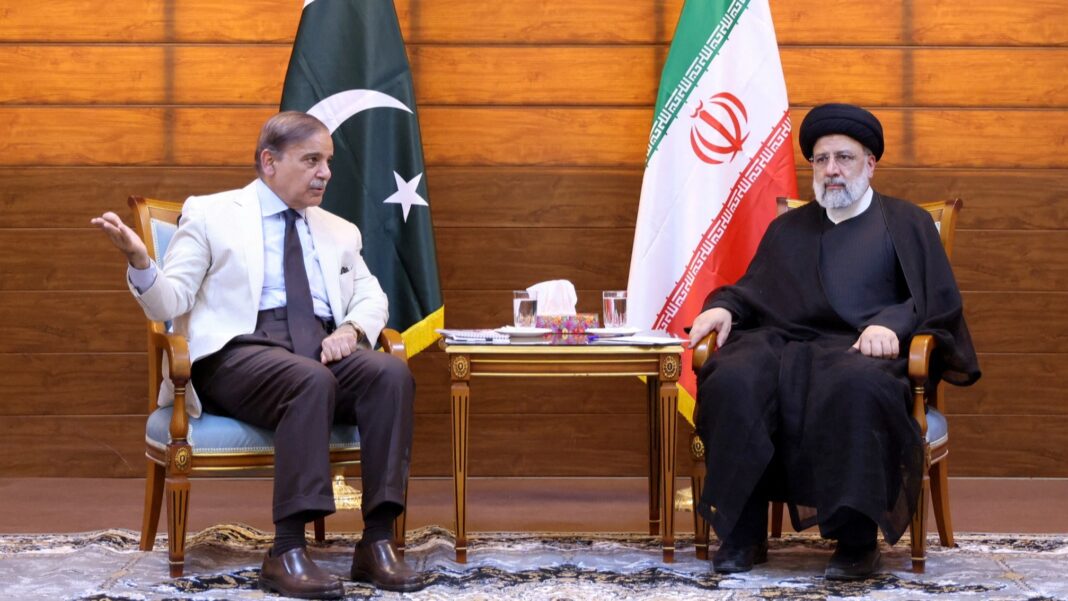Pakistan’s bid to ease a crippling foreign exchange crisis by importing energy from Iran could be in jeopardy, as a militant attack near their border has thrown future deals into doubt, analysts say.
Five Iranian border guards were killed in the May 21 clash with an extremist group in Saravan, a town in Iran near the frontier with Pakistan.
The incident came days after Pakistani Prime Minister Shehbaz Sharif and Iranian President Ebrahim Raisi met in a border village to inaugurate a 100 megawatt transmission line that will supply Iranian electricity to southern Pakistan’s port hub of Gwadar, which has drawn investment under China’s Belt and Road Initiative infrastructure push.
Iran’s foreign ministry blasted the “terrorist attack” as an “attempt to damage cooperation and friendly relations between Tehran and Islamabad” after the leaders’ first one-on-one meeting in a decade.
Militant group Jaish ul-Adl took responsibility for the border guard killings, in an apparent retaliation over what it says is the poor treatment of Shiite Iran’s Sunni Muslim minority.
“This attack can be a huge spoiler for prospective energy deals between Iran and Pakistan,” said Alex Vatanka, founding director of the Iran Program at the Washington-based Middle East Institute. “You cannot have economic cooperation in an environment of insecurity.”
Pakistan has struggled with militant attacks against the state for years. The border guard incident was followed just days later by another extremist group storming a natural gas and oil production facility in northwest Pakistan near the Afghan border, killing four police and two private guards.
But the border guard attack comes at an especially bad time for Islamabad as it grapples with an economic crisis punctuated by soaring inflation, which hit a record 36% in April, and dwindling foreign exchange reserves.
Pakistan’s forex levels have dropped to about $4.3 billion, only enough to pay for about one month of imports, while it’s facing some $3.7 billion in overseas debt due this month. A key $7 billion IMF bailout for the country of 230 million has stalled.
Islamabad is counting on future energy deals with Iran because it can pay in local currency rather than its vanishing supply of U.S. dollars, with lower costs and ease of transport other key factors.
“Without stopping incidents like these, the energy cooperation between Pakistan and Iran will not be possible,” said Przemyslaw Lesinski, an Iran expert at the War Studies Academy in Warsaw, referring to the border guard attack.
Pakistan does not import oil or gas from Iran although about one-third of the fuel sold in Pakistan has reportedly been smuggled across the Iranian border, hammering domestic refiners’ sales.
A Pakistani government official, who requested anonymity as he was not authorized to speak with media, told Nikkei Asia that Islamabad wants to formalize oil imports from Iran so it can pay for supplies in local currency. But US sanctions on Iran over its nuclear program could hold up a deal unless Islamabad can work out an agreement with Washington.
“Pakistan will need a nod from the U.S. for this arrangement to go ahead,” the official said.
Multiple Pakistani government officials have told Nikkei that Islamabad and Tehran are also in talks to resume a cross-border pipeline project that could supply 750 million cubic feet a day of Iranian natural gas to Pakistan, or about 20% of its needs.
Construction on the 2,700 kilometer line got underway a decade ago with Iran building part of the pipeline on its side of the border. But the project got held up on the Pakistani side over fears it could be hit by U.S. sanctions, and as it faced opposition from Iran archrival Saudi Arabia — Pakistan’s top energy supplier.
Tehran has told Pakistan to build a portion of the pipeline in its territory by next year or face a possible multi-billion-dollar penalty in arbitration court.
Local media reports said Pakistan has asked Washington for a waiver on any sanctions it could face for importing gas from Iran. But no decision has yet been made public.
“It will be very difficult for Pakistan to convince the U.S. to provide a waiver since the nuclear negotiations with Iran have hit the wall,” Lesinski said.
asia.nikkei.com

